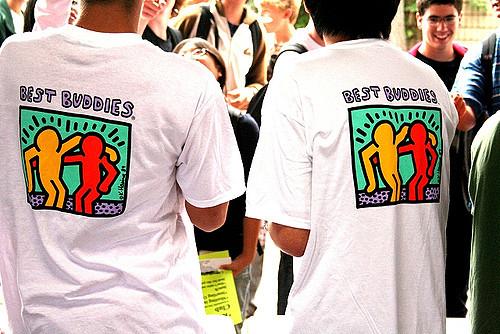If I thought Best Buddies at Northeastern would be representative of what it was at my high school, then I assumed I would be one of two or three guys. I was wrong; I was one of five guys. For some reason, this wasn’t very startling to me. I never assumed Best Buddies to be a “bro” thing. But the more and more I think about it, there doesn’t appear to be an appropriate reason for the large gender disparity. That is not to say that more men would necessarily make the organization function markedly better, but this appears to be an interesting summation of all the politically incorrect gender paradigms of our time.
The Best Buddies mission statement is stated as follows on its website: “[We are a] nonprofit 501(c)(3) organization dedicated to establishing a global volunteer movement that creates opportunities for one-to-one friendships, integrated employment and leadership development for people with intellectual and developmental disabilities.”
As strange as it seems, I don’t detect any natural or inherent gender targeting in this statement. If you look at several videos promoting the organization on the website or online, there appears to be less of a clear divide between gendered participation. I believe gender-targeted advertising is not a huge factor for such an inclusive group. There are no tell-tale signs of vastly different numbers between gendered participants, except for the words “volunteer movement.”
There is merit behind the assumption that women are more likely to volunteer. According to the Bureau of Labor Statistics, in 2015, 27.8 percent of women had volunteered at an organization in the year, while only 21.8 percent of men had. However, some of the discrepancy could be attributed to the fact that more women than men worked part-time jobs as their total employment, as the number of part-time employed people who volunteered was 31.1 percent this past year. Six percent more women equates to around 9 million more women overall, but Best Buddies has more than 200 million members worldwide, so the volunteerism gap is clearly not as stark as we would first assume. There must be another reason for men to not join the organization.
Unfortunately, such a small turnout cannot be explained by an overall trend of apathy towards the organization – avoiding those types of debilitating generalizations is partly why Best Buddies exists. It serves the purpose of educating and providing people with developmental or intellectual disabilities the opportunity to foster new connections and become more integrated into society. You’d be hard-pressed to find many purer causes than that. This is why it is a shame that so few men – at least that I’ve been aware of through several factions across Massachusetts – join and eventually have a buddy. We must assume this disparity is because there’s just something different among men that causes them to be incompatible for such an intensively, “care-filled” group. It’s not in their nature to be nurturers, only to be providers, programmed in them since prehistoric times. Because at the end of the day, that’s not what men do.
Maybe this heavily-skewed patriarchal view would have worked 50 years ago, but not in modern America. We cannot afford to be this unintentionally ignorant of this. It’s time to be progressive in order to represent the pulse of the nation – the most liberal part of the United States. Also, I’m not sure caring for another person if you’re a male means you’re liberal. It never did. Compassion. Patience. Empathy. These are human traits, meaning they exist in all of us, somewhere – yes, even patience. In the midst of the clairvoyance we like to think we have, the myopic haze clouds us. Sometimes we don’t observe the people or organizations that require our assistance – they aren’t any more or less right than cancer research or ending world hunger, but they still need our help. Best Buddies is one of those organizations, and purely from an egalitarian perspective, gender roles and brash politics aside, it deserves our attention. And by our, I mean all genders.
Perhaps there is some combination of assiduity and information asymmetry between Best Buddies and its target audience, basically anyone with some semblance of a heart, but that does not excuse men from participating. I’m not saying this because the addition of men would make the group more effective, but it might just make its volunteers better people. Best Buddies is an enriching experience for both parties, and maybe some more guys need to be exposed to this program. A lack of information breeds inactivity, and inactivity breeds total apathy. But enlightenment, by that same token, fosters activity, and this means we care. And often, I think we just need to care more, guys. Just a little more.
- – Lal Birali is a freshman pursuing a combined major in computer science and business.
Photo courtesy Michael Chen, Creative Commons









